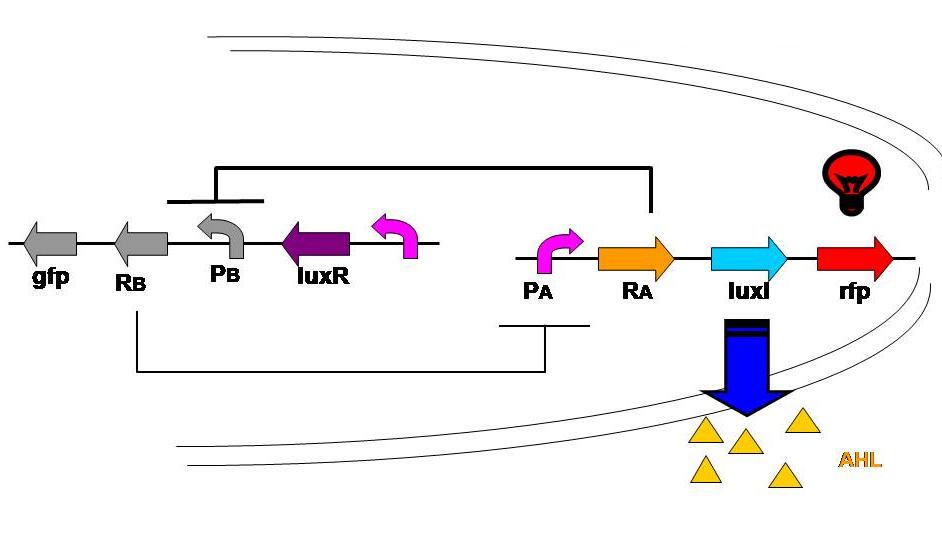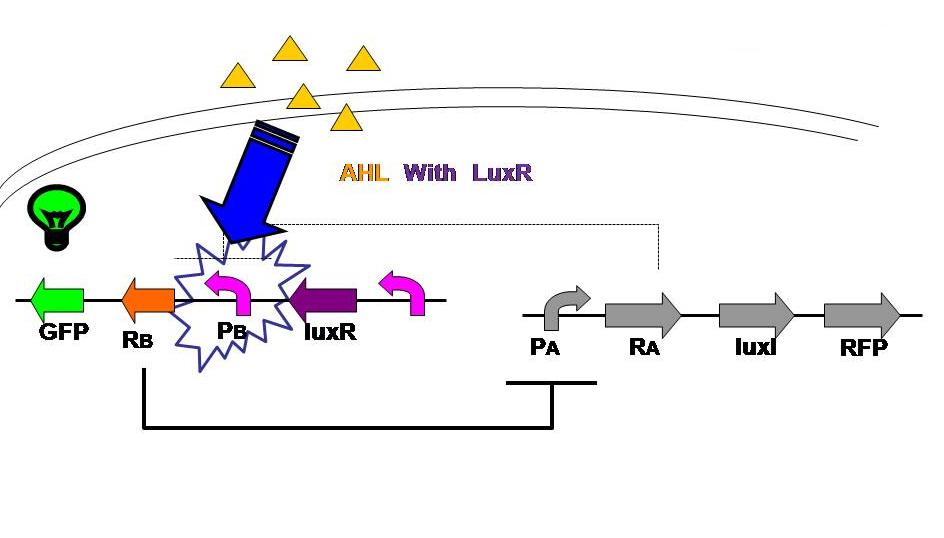Tokyo/Genetic circuit
From 2007.igem.org
(→Workers (State-A)) |
(→Workers (State-A)) |
||
| Line 11: | Line 11: | ||
==Workers (State-A)== | ==Workers (State-A)== | ||
As shown in '''Fig. 2''', | As shown in '''Fig. 2''', | ||
| - | an A-state cell, in which the promoter Pa is "on," expresses the repressor Ra, | + | an A-state cell, in which the promoter Pa is "on," expresses the repressor Ra, LuxI, and RFP. The repressor Ra "turns off" the promoter Pb and inhibits the cell-state change. |
This cell also expresses LuxI, which makes AHL, cell-cell communication molecules. Downstream of these genes, there is an RFP gene; therefore, we would be able to detect state-A cell using flow cytometer. | This cell also expresses LuxI, which makes AHL, cell-cell communication molecules. Downstream of these genes, there is an RFP gene; therefore, we would be able to detect state-A cell using flow cytometer. | ||
[[Image:A status.JPG|thumb|350px| '''Fig.2: Workers (State-A)'''<br>A worker, an A-state cell expresses the Pa’s downstream genes including the repressor Ra, luxI, and RFP. The Pb and its downstream genes for idlers are positively repressed. ]] | [[Image:A status.JPG|thumb|350px| '''Fig.2: Workers (State-A)'''<br>A worker, an A-state cell expresses the Pa’s downstream genes including the repressor Ra, luxI, and RFP. The Pb and its downstream genes for idlers are positively repressed. ]] | ||
Revision as of 02:45, 26 October 2007
Abstract Concept & Model Requirements Genetic_circuit Works About_our_team
Genetic Circuit
Fig.1 is an outline of the genetic circuit in our model, designed to realize our Concept & Model.
All cells, wokers and idlers, have THE SAME genetic circuit (just as 'society' members have practically the same genetic backgrounds).
Workers (State-A)
As shown in Fig. 2, an A-state cell, in which the promoter Pa is "on," expresses the repressor Ra, LuxI, and RFP. The repressor Ra "turns off" the promoter Pb and inhibits the cell-state change. This cell also expresses LuxI, which makes AHL, cell-cell communication molecules. Downstream of these genes, there is an RFP gene; therefore, we would be able to detect state-A cell using flow cytometer.
Idlers (State-B)
Fig. 3 shows a B-state cell, in which promoter PB is "turned on" in the presence of AHL, and repressor Rb and GFP are expressed. Repressor Rb represses the expression of promoter Pa and thereby RFP; therefore, fluorescence of GFP is used to detect state-B cells.
If Workers are removed...
As shown in Fig 4, if A-state cells are removed, B-state cells sense the absense of A-cells. Responding to the decrease of AHL, cells stop producing repressor Rb. Now that repressions of Pa by Rb as well as that of Pb by Ra are declined, either states cannot be clearly expressed, as if the cells were reset.
Hybrid promoter
To realize such a genetic circuit, Pb should be "Hybrid promoter" regulated by AHL and LacI as shown in the figures.



